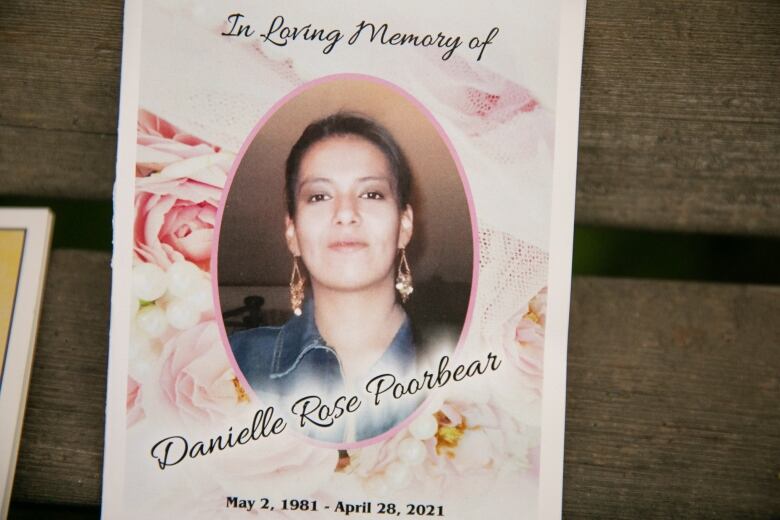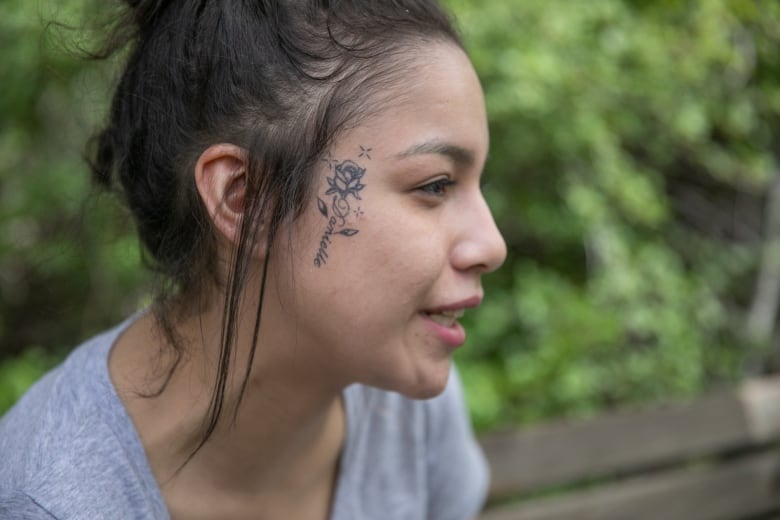
Laina Tuckanow, 21, stands beside two dirt-covered graves in Riverside Memorial Park Cemetery in Regina. They’re not marked with headstones or covered in grass yet.
In the past eight months, the young woman has had to bury her mother and her grandmother. They both died from COVID-19.
Tuckanow’s grief is still so raw and her fear of COVID-19 so intense, that she’s uncomfortable with reopening plans that will lift all restrictions and allow people in Saskatchewan to ditch their masks and gather in large crowds as of July 11.
She wants people to remember that the virus is still a threat and that thousands of Canadians who have lost loved ones during the pandemic may find the return to normal activities both daunting and painful. More than 26,000 Canadians have died from COVID-19.
“It’s not normal for everyone,” she said. “I just can’t process or comprehend every day going on with my days and going out in public. It’s just all totally different now.”

Saskatoon psychiatrist Dr. Tamara Hinz said the loosening of restrictions over the next couple months will be a transition period during which people should be “open and sensitive” to how others could have varying levels of comfort and lingering anxiety.
“As much as a lot of us are just ready to forget this past year and a half and really get back into normal, I think it’s really important to acknowledge that for a lot of us, normal is not something we’re going to experience again,” she said.
Hinz said people will adjust differently depending on their personality characteristics, such as risk tolerance, and their experiences, such as the death of a loved one from COVID-19 or working in a hospital COVID-19 ward.
“It’s still so relevant that we’ve all been through the same storm but not necessarily in the same boats.”
WATCH | Laina Tuckanow describes her final moments with her mother:
Laina Tuckanow describes her final moments in the ICU ward with her mother, Danielle Poorbear, who died from COVID-19 at the age of 39. Tuckanow says the pandemic has forever changed her life. 2:01
‘She just wanted to be loved’
Tuckanow’s 63-year-old grandmother, Merle Hapa, was a residential school survivor from Sioux Valley Dakota First Nation who loved gospel music and visiting family in Saskatchewan, Manitoba and the United States.
She died from COVID-19 in Billings, Mont., on Oct. 7, 2020. Her family was forced to say their goodbyes over Facetime while Hapa was on a ventilator.
“Nobody was by her side, and nobody could see her. She had to suffer on her own in the hospital,” said Tuckanow. “I just said I loved her and I will always live on for her and pass on what she has taught me.”

Six months later, Tuckanow had to call an ambulance for her 39-year-old mother, Danielle Rose Poorbear, known as Rosie, from north central Regina. Poorbear, a mother of nine who had diabetes and was undergoing cancer treatment when she tested positive, was scared of the coronavirus and had tried to limit her contact with people, her daughter said.
“The last few words she said to me [before going to the hospital] was that she couldn’t breathe and it hurt to breathe. And I just tried my hardest to be there for her,” said Tuckanow.

Tuckanow said she will always feel some anger that the pandemic meant her mother’s final moments in life required family members to be fully garbed in personal protective gear at her hospital bed. Tuckanow said she couldn’t resist defying hospital protocols to comfort her mother before she died.
“I’m happy that I took that ugly mask off. I’m happy I took the gloves off. I wanted to touch my mom one last time, you know? While her heart was beating.”
‘I’m not who I used to be’
Tuckanow said she told her mother she would live for her and be the best daughter she could be, and she believes her mother, who was on a ventilator, heard her words because Tuckanow saw tears rolling down her cheeks.
Tuckanow grew up in the foster care system because of Poorbear’s struggles with addiction. Still, Poorbear was her “best friend,” she said, and a “loving, kind mother.”
“She just wanted to be loved, and she really was,” Tuckanow said. “She was like the candle that lit up everyone’s darkness.”

The young woman was working on her final high school credits before the pandemic hit, after dropping out of school as a teenager. However, she doesn’t own a laptop and struggled with virtual classes. She’s taking a break from school while she grieves, and hopes to resume in the fall.
Last month, she got a memorial tattoo of a rose with a stem that says “Danielle” to honour her mother.
And she’s sharing her family’s loss to encourage people to stay vigilant against the virus and protect themselves and their families.
“It took my grandma away. And then it took my mom…. I just pray everyone else in my life is going to be OK,” she said.
As for Tuckanow, she said she is “totally different” now and can’t envision the course of her post-pandemic life.
“I’m not who I used to be.”
Hinz, the psychiatrist based in Saskatoon, offers this advice to people adjusting to easing restrictions:
- Expect that people will adjust at their own pace and be patient with this.
- Continue to have open dialogue with friends and family when planning activities so that people have clear expectations and can gauge their own comfort level with social events.
- Seek mental health support if your pandemic-related anxiety is not decreasing at all despite objective indicators such as decreasing case rates or vaccine milestones.













